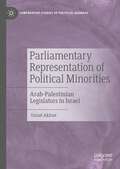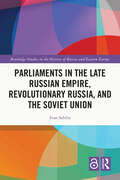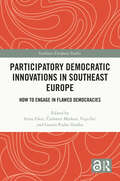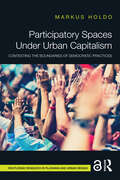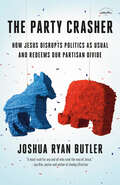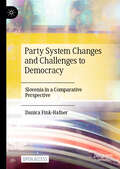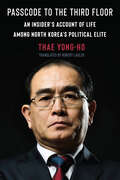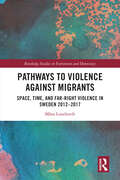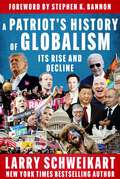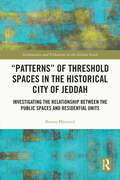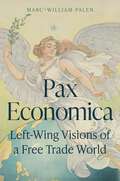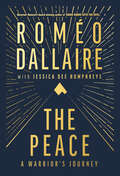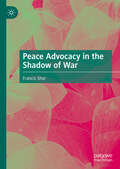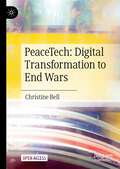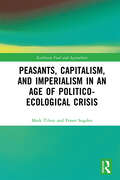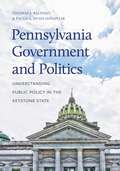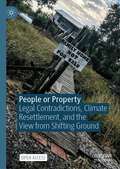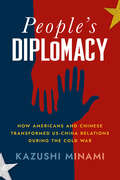- Table View
- List View
Parliament in Ethiopia: Participation, Representation and Resistance (African Governance)
by Mercy Fekadu MulugetaAfrican legislatures remain understudied, yet democratisation, development and peacebuilding all depend on these key political institutions. This book provides an in-depth analysis of Ethiopia’s parliament, a country of key political and strategic importance to the whole region. In 1931, Ethiopia’s monarchical government introduced a system of parliamentary democracy with seemingly contradictory objectives; it wanted to legitimize its rule in a changing world, and also needed to provide a respectable retirement vocation (as senators and deputies) to sections of the aristocracy it ousted from power. This paradox of recognizing the parliament as essential to modern governance yet deliberately seeking weak institutions that are unable or unwilling to challenge those in power continues to haunt the parliament to this day. Ethiopia continues to struggle to maintain political stability, and the separation of power between government and parliament and a system of checks and balances are yet to substantially flourish. Drawing on extensive original data gathered from interviews and surveys, this book investigates the legal and practical status of federal representative institutions in Ethiopia from 1931 up to and including 2021. It delves into the rules and routines of parliament, its contextually and historically grounded culture of representation, and the techniques of manoeuvring executive bureaucracies. The book also aims to understand the extent of civil dis/engagement and the perceptions and role of citizens in shaping parliament, and how the mandates and functions of individual MPs are also determined by cultural and socio-economic factors such as gender, population, inequality and conflict. This book’s in-depth and original analysis will be of interest to researchers across African studies, politics, development, and governance.
Parliamentary Representation of Political Minorities: Arab-Palestinian Legislators in Israel (Comparative Studies of Political Agendas)
by Osnat AkiravThis book assesses parliamentary speeches given by Arab representatives in the Israeli Knesset over the last 70 years, in order to throw light on the representation of political minorities. It examines several political ‘identities’ available to legislators with intersectional representation – including gender, religion and nationality – and considers the ways in which legislators utilise these various identities when representing their constituencies to further their political aims. The book also puts forward a new theoretical framework to better assess intersectional representation, especially in multi-national settings. It will appeal to all those interested in public policy, political representation, and comparative politics, as well Middle Eastern politics.
Parliaments in the Late Russian Empire, Revolutionary Russia, and the Soviet Union (Routledge Studies in the History of Russia and Eastern Europe)
by Ivan SablinThis book examines the meanings that were attached to the terms “parliament” and “parliamentarism” in the different historical and discursive contexts of the late Russian Empire, revolutionary and Soviet Russia, and the Soviet Union. It discusses those institutions referred to as parliaments by contemporaries, gives special attention to their functions, and traces the broader debates on parliamentarism within Russia and the Soviet Union, in Russian émigré circles, and among foreign observers. It highlights that only the late imperial and perestroika assemblies can be considered legislative institutions that expressed dissensus but argues that other assemblies, often referred to as “rubber-stamp” parliaments due to their lack of legislative competence and influence over other authorities, should not be dismissed. The Supreme Soviet, for instance, provided an integrative function binding society and elites in a top-down manner, while its deputies engaged in information acquisition and state micromanagement through interactions with their constituents. It also played an important role in interparliamentary relations and, as one of the first institutions of nominal parliamentarism in an autocratic single-party regime, of which there were many in the twentieth century, served as a model for numerous state socialist regimes. By addressing the role of parliaments in reassembling imperial spaces through political representation and the functions of nominal legislative institutions, the book explores the contribution of Russian and Soviet assemblies to global political modernity.
Participatory Democratic Innovations in Southeast Europe: How to Engage in Flawed Democracies (ISSN)
by Irena Fiket Čedomir Markov Vujo Ilić Gazela Pudar DraškoThis volume strengthens the dialogue between conceptual perspectives, approaches and fields on deliberative and participatory forms of democratic innovation and offers novel insights, focusing on the Southeast European space. Traditional forms of participation seem insufficient in satisfying the growing complexity of the democratic processes, especially in the context of autocratizing societies. It is crucial to examine the possibilities of democratic innovation in political research and practice, trying to establish a connection between the possibilities and limits of representative democracy and social movements as possible carriers of the process of democratic innovation. This book offers novel insights into practices of civil society and social movements and their pathways carved to initiate a deep change in political thinking and practice and compelling insights for scholars and students of Southeast Europe, social movements and democracy.
Participatory Spaces Under Urban Capitalism: Contesting the Boundaries of Democratic Practices (Routledge Research In Planning And Urban Design Ser.)
by Markus HoldoCan people use new participatory spaces to reclaim their rights as citizens and challenge structures of political power? This book carefully examines the constraints and possibilities for participatory governance under capitalism. To understand what is at stake in the politics of participation, we need to look beyond the values commonly associated with it. Citizens face a dilemma: should they participate, even if this helps to sustain an unjust system, or not participate, thereby turning down rare opportunities to make a difference? By examining the rationale behind democratic innovation and the reasons people have for getting involved, this book provides a theory of how citizens can use new democratic spaces to challenge political boundaries. Connecting numerous international case studies and presenting original research from Rosario, Argentina, this book offers a crucial corrective to previous research. What matters most is not the design of new models of participation nor is it the supposed radical imagination of political leaders. It is whether people use new spaces for participation to renegotiate what democracy means in practice. Bridging critical urban studies and democratic theory, this book will be of interest to researchers and students in the fields of democratic innovations, political economy and urban planning. It will also provide activists and practitioners of participatory democracy with important tools to expand spaces of grassroots democracy.
Partisan Hostility and American Democracy: Explaining Political Divisions and When They Matter (Chicago Studies in American Politics)
by Matthew Levendusky James N. Druckman John Barry Ryan Samara Klar Yanna KrupnikovAn unflinching examination of the effects and boundaries of partisan animosity. For generations, experts argued that American politics needed cohesive parties to function effectively. Now many fear that strong partisan views, particularly hostility to the opposing party, are damaging democracy. Is partisanship as dangerous as we fear it is? To provide an answer, this book offers a nuanced evaluation of when and how partisan animosity matters in today’s highly charged, dynamic political environment, drawing on panel data from some of the most tumultuous years in recent American history, 2019 through 2021. The authors show that partisanship powerfully shapes political behaviors, but its effects are conditional, not constant. Instead, it is most powerful when politicians send clear signals and when an issue is unlikely to bring direct personal consequences. In the absence of these conditions, other factors often dominate decision-making. The authors argue that while partisan hostility has degraded US politics—for example, politicizing previously non-political issues and undermining compromise—it is not in itself an existential threat. As their research shows, the future of American democracy depends on how politicians, more than ordinary voters, behave.
The Party Crasher: How Jesus Disrupts Politics as Usual and Redeems Our Partisan Divide
by Joshua Ryan ButlerIn this insightful, nonpartisan roadmap toward faithful political engagement and ultimate allegiance to Jesus, pastor Joshua Ryan Butler diagnoses the roots of political conflict tearing apart the church and prescribes a practical and prophetic way forward.&“A must-read for any and all who seek the way of Jesus.&”—Jay Kim, pastor and author of Analog ChristianHave you noticed a deeper level of political division in your community or church? If so, you&’re not alone. This powerful, accessible book exposes the religious nature of modern political movements and how they compete with faithfulness to Christ.Rather than retreat from the political realm, The Party Crasher will help you understand the politics of our age and equip you with the wisdom to faithfully navigate them. Key takeaways include:• How to develop a Christian posture for political life and promote unity in the church.• When to be bold.• How to identify and repent from our political idols.• How the way we worship can help us avoid division.This is not a book about putting politics aside, it&’s a book about putting politics in their place so that we might be better disciples of Jesus in whichever party or place we find ourselves.
Party Organization and Electoral Success of New Anti-establishment Parties (Routledge Studies on Political Parties and Party Systems)
by Tomáš CirhanThis book examines the new anti-establishment parties electorally succeeding at the expense of their established counterparts and argues that party organization matters for the electoral success of anti-establishment parties. It explores a relationship between these parties´ electoral success and their party organization. Using a framework to explain the role of organizational features such as local party branches, party membership, and party elites in this process, it reveals how they help parties to be more stable, cohesive, and legitimate; a state that facilitates better conditions for electoral success. It also shows that control over party organization is achieved partially by the existence of a corporate network associated with party leaders´ businesses. This book will be of key interest to scholars and students of party politics and political parties, anti-establishment politics, and Eastern European politics.
Party System Changes and Challenges to Democracy: Slovenia in a Comparative Perspective
by Danica Fink-HafnerThis open access book focuses on the nexus between “party system stability” and “democratic consolidation”, using Slovenia as a case study. Its findings are presented from a comparative perspective to illustrate the commonalities and differences found in research on Central European post-socialist countries and former Yugoslav countries. On the one hand, Slovenia’s characteristics (including the characteristics of its transition to democracy) are far more similar to those of Central European post-socialist countries than Western Balkan countries. On the other, Slovenia shares some similarities with other parts of the former Yugoslavia – especially its experiences with the political system of socialist self-management, elements of a market economy under socialism, and war following the end of socialism (albeit the conflict in Slovenia was very short and rather mild in comparison to those in other parts of socialist Yugoslavia). Slovenia’s experiences with rapid but limited democraticbacksliding under the Janša government (March 2019–June 2022) were halted by the 2022 national election – in contrast to the more widely known cases of Hungary and Poland, where such backsliding took place incrementally over a longer period of time that included several election cycles.
Passcode to the Third Floor: An Insider's Account of Life Among North Korea's Political Elite
by Thae Yong-hoThae Yong-ho was a leading North Korean diplomat to the United Kingdom and Northern Europe—until his dramatic defection to South Korea in 2016. In this gripping tell-all, he reveals the inner workings of the North Korean regime and shares the story of his decision to leave.Thae spent nearly three decades working under three generations of the ruling Kim dynasty after entering the foreign service as an idealistic twenty-seven-year-old “red warrior” eager to strive for the “socialist motherland.” During this time, he witnessed the arbitrary and tyrannical rule of the Kim family and the enigmatic “Third Floor,” a powerful group of high-ranking officials. Thae provides up-close portraits of the excesses of the North Korean elite and the depths of the cult of personality around the Kims, describing experiences such as concocting reports of Europeans celebrating the birthdays of Kim Il-sung or Kim Jong-il and escorting Kim Jong-un’s older brother to Eric Clapton concerts in London. He also details the economic and political consequences of North Korea’s pursuit of the bomb and the immiseration of the vast majority of the population.Today a politician in South Korea who advocates unification, Thae offers a powerful plea for the families torn apart by the conflict—including his own, as his brother and sister likely now languish in prison camps. A best-seller in South Korea, Passcode to the Third Floor is an unparalleled look at North Korean politics and diplomacy, giving readers intimate access to the regime’s innermost secrets.
Pathways of Autocratization: The Tumultuous Journey of Bangladeshi Politics (Routledge Advances in South Asian Studies #44)
by Ali RiazPathways of Autocratization addresses contemporary global politics’ one of the most important questions: how does a country regress from a democracy to an autocracy? This book offers a novel framework for understanding the processes that erode democracy and lead to autocracy and explains a specific instance of democratic backsliding in Bangladesh: the world’s eighth most populous country. With probing analysis of events and trends of Bangladeshi politics, especially since 2009, the book contextualizes the country’s autocratization process within global trends and compares it with others which have trod a similar path in recent decades, including Bolivia, Cambodia, Hungary, Poland, the Philippines and Turkey. The book discusses the implications of institutional changes, the role of pliant media, the contribution of ideology, and the conduct of international actors in the autocratization process while also mapping future trajectories for the country. Succinct, incisive, and thought provoking, this book is rich in its theoretical robustness and empirical details. This is a must-read for anyone interested in understanding the dynamics of democratic backsliding and prospects for reversing this trend.
Pathways to Violence Against Migrants: Space, Time and Far Right Violence in Sweden 2012–2017 (Routledge Studies in Extremism and Democracy)
by Måns LundstedtPathways to Violence Against Migrants traces the different pathways, or combinations of causal mechanisms, that lead from non-violent opposition to migration into anti-migrant violence. Applying the conceptual apparatus of social movement studies (frames, relations, opportunities and collective emotions), the book develops six distinct sequences of causal mechanisms. These show how violence can develop through rapid processes of moral outrage and far right mobilisation, through long processes of uneven demobilisation and escalation, or independently of any nonviolent protest at all. The six pathways are developed through a comparative, mixed-methods study of 81 cases of anti-migrant violence in Sweden between 2012 and 2017. The cases involve various actors (ranging from unorganised youth gangs and village associations to neo-Nazi organisations) as well as very different types and intensities of violence (from death threats to arson attacks and bombings). Demonstrating the diversity of pathways to violence in a restricted setting and against a restricted category of targets, the book argues strongly against reducing the causes of violence to individual pathology, to ideological ”extremism”, or to any single explanatory model. This book will be of interest to researchers of political violence, the far right, anti-migrant politics, racism, and social movements.
A Patriot's History of Globalism: Its Rise and Decline
by Larry SchweikartLarry Schweikart has won wide acclaim for his number one New York Times bestseller, A Patriot&’s History of the United States. Now, with A Patriot's History of Globalism, Schweikart shows that globalism, or the attempt to form a one-world government is nothing new. In the wake of Napoleon's defeat in 1814, the globalists of the day (mostly monarchs) sought to create a governing arrangement for Europe. Within forty years, three of the major participants were at war with each other. After World War I, they tried again at Versailles, this time even more aggressively changing boundaries of nations and moving populations. That attempt only lasted twenty years before another major war between the participants. Yet again, after World War II, globalists used the threat of the atomic bomb to try to form an international government with the United Nations. Most recently, the World Economic Forum and World Health Organization are attempting to minimize nationalities with global control of money and medicine. But there are signs this tide has been reversed and is finally in decline. A Patriot's History of Globalism is the gold standard text for the history of globalism.
“Patterns” of Threshold Spaces in the Historical City of Jeddah: Investigating the Relationship Between the Public Spaces and Residential Units (Architecture and Urbanism in the Global South)
by Basma Massoud“Patterns” of Threshold Spaces in the Historical City of Jeddah explores the meaning of threshold spaces and investigates the relationship between the public spaces and residential units in the historical city of Jeddah, Saudi Arabia, while at the same time revisiting Christopher Alexander’s theory in his canonical 1977 book, A Pattern Language. This book questions and analyses “patterns” relating to the cultural, social, and environmental particularities of Jeddah, with special attention paid to the effect of gender segregation in the city’s urban configuration. It discusses the extension that has been undertaken through testing a concept from the urban design theory of the West (the United States and Canada) and applying it to an Islamic city to find patterns in four different scales, which form the basis of the investigation (body, building, street, and city). Empirical methods have been used in the context of historical Jeddah, through which patterns are investigated using different approaches for the different scales. The book aims to explore the meaning of threshold spaces in old Jeddah. Furthermore, it shows that there are eighteen patterns of threshold spaces in the old town: patterns that are solely related to this specific case study, as well as modified patterns to the ones explored by Christopher Alexander. This book shall allow not only a better understanding of the relationship between housing and the historical city but also an exploration of the role of the threshold space in shaping the old city of Jeddah. It will be of interest to researchers, students of architecture, urban planning and anthropology studies, and people involved in cultural heritage, both academics and practitioners.
Pax Economica: Left-Wing Visions of a Free Trade World
by Marc-William PalenThe forgotten history of the liberal radicals, socialist internationalists, feminists, and Christians who envisioned free trade as the necessary prerequisite for anti-imperialism and peaceToday, free trade is often associated with right-wing free marketeers. In Pax Economica, historian Marc-William Palen shows that free trade and globalisation in fact have roots in nineteenth-century left-wing politics. In this counterhistory of an idea, Palen explores how, beginning in the 1840s, left-wing globalists became the leaders of the peace and anti-imperialist movements of their age. By the early twentieth century, an unlikely alliance of liberal radicals, socialist internationalists, feminists, and Christians envisioned free trade as essential for a prosperous and peaceful world order. Of course, this vision was at odds with the era’s strong predilections for nationalism, protectionism, geopolitical conflict, and colonial expansion. Palen reveals how, for some of its most radical left-wing adherents, free trade represented a hard-nosed critique of imperialism, militarism, and war.Palen shows that the anti-imperial component of free trade was a phenomenon that came to encompass the political left wing within the British, American, Spanish, German, Dutch, Belgian, Italian, Russian, French, and Japanese empires. The left-wing vision of a “pax economica” evolved to include supranational regulation to maintain a peaceful free-trading system—which paved the way for a more liberal economic order after World War II and such institutions as the United Nations, the European Union, and the World Trade Organization. Palen’s findings upend how we think about globalisation, free trade, anti-imperialism, and peace. Rediscovering the left-wing history of globalism offers timely lessons for our own era of economic nationalism and geopolitical conflict.
The Peace: A Warrior's Journey
by Romeo DallaireInternational humanitarian icon and bestselling author General Roméo Dallaire guides readers on a crucial and inspiring journey from past wars through post-modern conflict toward a vision of lasting peace.In The Peace, Roméo Dallaire shows us the past, present and future of war through the prism of his own life. Trained in classic warfare during the Cold War era of mutual deterrence, Dallaire in good faith commanded the UN&’s peacekeeping mission for Rwanda in 1994, only to see the country abandoned and descend into the hell of genocide. The battered, tortured warrior who emerged from that catastrophe grew determined to help repair the new world disorder—to prevent genocide, abolish the use of child soldiers, and find ways to intervene in, even prevent, conflicts in defence of humanity. And so Dallaire helped advance the doctrines of Responsibility to Protect and the Will to Intervene only to witness those initiatives falter because of the same old power politics, national self-interest and general indifference that had allowed the genocide in Rwanda to unfold unchecked. In his final act, Dallaire has become a warrior working towards a better future in which those old paradigms are rejected and replaced. In The Peace he calls out the elements that undermine true security because they reinforce the dangerous, self-interested belief that &“balance&” of power and truces are the best we can do. Too often we say we are &“at peace&” because the bombs are falling elsewhere and we, ourselves, are not under attack. Dallaire shows us a path, instead, to what he calls &“the peace,&” a state where, above all else, humanity values the ties that bind us and the planet together—and acts accordingly. This book is the cri de coeur of a warrior who has been to hell and back and hopes to help guide us to a better place.
Peace Advocacy in the Shadow of War
by Francis ShorFor peace advocates a corollary to Clausewitz’s dictum that “war is politics by other means” might be that other politics could prevent war. By highlighting both individual peace advocates and antiwar/peace organizations from World War I through the wars of the 21st century, the chapters will provide insights into how these individuals and organizations articulated their opposition to and mobilized against specific wars and international/regional conflicts. Organized roughly in chronological order, each chapter will illuminate the socio-historical conditions under which such peace advocacy contested state aggression and armed combat at the national and/or transnational levels. Beyond understanding the specific socio-historical circumstances within which these antiwar and peace advocates and organizations operated and their resultant achievements and failures, the book as a whole will examine the kind of politics that perpetuate war and those that offer a challenge to that perpetuation. Scholars, students, and the general public interested in the history of modern and contemporary wars, peace and conflict studies, and ethical/political perspectives in the 20th and 21st centuries should find much to reflect upon in this book.
PeaceTech: Digital Transformation to End Wars
by Christine BellWhy are we willing to believe that technology can bring about war… but not peace? PeaceTech: Digital Transformation to End War is the world's first book dealing with the use of technological innovation to support peace and transition processes. Through an interwoven narrative of personal stories that capture the complexity of real-time peace negotiation, Bell maps the fast-paced developments of PeaceTech, and the ethical and practical challenges involved.Bell locates PeaceTech within the wider digital revolution that is also transforming the conduct of war. She lays bare the ‘double disruption’ of peace processes, through digital transformation, and through changing conflict patterns that make processes more difficult to mount. Against this backdrop – can digital peacebuilding be a force for good? Or do the risks outweigh the benefits?PeaceTech provides a 12-Step Manifesto laying out the types of practice and commitment needed for successful use of digital tools to support peace processes. This open access book will be invaluable primer for business tech entrepreneurs, peacebuilders, the tech community, and students of international relations, informatics, comparative politics, ethics and law; and indeed for those simply curious about peace process innovation in the contemporary world.
Pearson Edexcel A Level UK Government and Politics Seventh Edition
by Neil McNaughton Toby CooperBuild subject knowledge, develop critical understanding and help students practise the skills they need to succeed in their study of UK Government and Politics. This fully updated textbook for Pearson Edexcel A level Politics will help students develop, understand and engage in the latest developments in UK Government and Politics. Written by Neil McNaughton and revised by Toby Cooper, this new edition is specially designed to reflect the Pearson Edexcel specification and let students approach complex topics with confidence.- Comprehensively covers Government of the UK and Politics of the UK- Places recent developments in a historical context throughout to show the influence of political history on current events- Builds subject confidence by highlighting key terms and explaining synoptic links between different topics in the specification - Develops analysis and evaluation skills through debates and practice questions - Provides answer guidance for practice questions online at www.hoddereducation.com/EdexcelUKPolitics7E
Pearson Edexcel A Level UK Government and Politics Seventh Edition
by Neil McNaughton Toby CooperBuild subject knowledge, develop critical understanding and help students practise the skills they need to succeed in their study of UK Government and Politics. This fully updated textbook for Pearson Edexcel A level Politics will help students develop, understand and engage in the latest developments in UK Government and Politics. Written by Neil McNaughton and revised by Toby Cooper, this new edition is specially designed to reflect the Pearson Edexcel specification and let students approach complex topics with confidence.- Comprehensively covers Government of the UK and Politics of the UK- Places recent developments in a historical context throughout to show the influence of political history on current events- Builds subject confidence by highlighting key terms and explaining synoptic links between different topics in the specification - Develops analysis and evaluation skills through debates and practice questions - Provides answer guidance for practice questions online at www.hoddereducation.com/EdexcelUKPolitics7E
Peasants, Capitalism, and Imperialism in an Age of Politico-Ecological Crisis (Earthscan Food and Agriculture)
by Mark Tilzey Fraser SugdenThis book utilises a new theoretical approach to understand the dynamics of the peasantry, and peasant resistance, in relation to capitalism, state, class, and imperialism in the global South. In this companion volume to Peasants, Capitalism, and the Work of Eric R. Wolf, the authors further develop their thinking on agrarian transitions to capitalism, the development of imperialism, and the place of the peasantry in these dynamics, with special reference to the global South in an era of politico-ecological crisis. Focusing on the political role of the peasantry in contested transitions to capitalism and to modes of production outside of, and beyond, capitalism, the book contends that an understanding of these dynamics requires an analysis of class struggle and of the resources, material and discursive, that different classes can bring to bear on this struggle. The book focuses on the rise of capitalism in the global South within the context of imperial subordination to the global North, and the place of the peasantry in shaping and resisting these dynamics. The book presents case studies of contested transitions to agrarian capitalism in Bolivia, Ecuador, Guatemala, Mexico, Peru, and South Asia. It also examines the case of transition to a post-capitalist mode of production in Cuba. The book concludes with an assessment of the nature of capitalism and imperialism within the context of the contemporary politico-ecological crisis, and the potential role of the peasantry as agent of emancipatory change towards social and environmental sustainability. This book will be of great interest to students and researchers in the areas of peasant studies, rural politics, agrarian studies, development, and political ecology.
Pennsylvania Government and Politics: Understanding Public Policy in the Keystone State (Keystone Books)
by Thomas J. Baldino Paula A. Duda HoloviakThis book provides a comprehensive examination of the Keystone State’s formal and informal political institutions and players, past and present, and elucidates the place each holds in governing the commonwealth today. Covering a period of more than three hundred years, this volume presents a clear and succinct overview of• the commonwealth’s political history, culture, and geography;• interactions between office holders, civil servants, special interest groups, and the media;• policy development and implementation;• how laws are created, enacted, and enforced;• hierarchy and interaction among state, county, local, and special district government bodies and officials;• tax collection and disbursement; and• the political upheaval in the wake of the COVID-19 pandemic and the 2020 presidential election.Featuring practical appendixes and interviews with current and past office holders, bureaucrats, party leaders, and political journalists, this astute and informative book is an indispensable tool for understanding politics in the Keystone State.
People or Property: Legal Contradictions, Climate Resettlement, and the View from Shifting Ground
by Alessandra Jerolleman Elizabeth Marino Nathan Jessee Liz Koslov Chantel Comardelle Melissa Villarreal Daniel de Vries Simon MandaThis open access book explores the intersection of property law, relocation, and resettlement processes in the United States and among communities that grapple with migration as an adaptation strategy. As communities face the prospect of relocating because of rising seas, policy makers, disaster specialists, and community leaders are scrambling to understand what adaptation pathways are legally possible. While in its ideal application, law functions blindly and without variation, the authors find that legal contradictions come to bear on resettlement processes and place certain communities further in harm’s way. This book will unearth these contradictions in order to understand why successful community-based resettlement has presented such a challenge to communities that are experiencing increasing land deterioration as a result of climate change.
People's Diplomacy: How Americans and Chinese Transformed US-China Relations during the Cold War (The United States in the World)
by Kazushi MinamiIn People's Diplomacy, Kazushi Minami shows how the American and Chinese people rebuilt US-China relations in the 1970s, a pivotal decade bookended by Richard Nixon's 1972 visit to China and 1979 normalization of diplomatic relations. Top policymakers in Washington and Beijing drew the blueprint for the new bilateral relationship, but the work of building it was left to a host of Americans and Chinese from all walks of life, who engaged in "people-to-people" exchanges. After two decades of estrangement and hostility caused by the Cold War, these people dramatically changed the nature of US-China relations. Americans reimagined China as a country of opportunities, irresistible because of its prodigious potential, while Chinese reinterpreted the United States as an agent of modernization, capable of enriching their country and rejuvenating their lives. Drawing on extensive research at two dozen archives in the United States and China, People's Diplomacy redefines contemporary US-China relations as a creation of the American and Chinese people.
Perestroika and the Party: National and Transnational Perspectives on European Communist Parties in the Era of Soviet Reform
by Francesco Di PalmaCountless studies have assessed the dramatic reforms of Mikhail Gorbachev, but their analysis of the impact on European communism has focused overwhelmingly on the Soviet Union and Eastern bloc nations. This ambitious collection takes a much broader view, reconstructing and evaluating the historical trajectories of glasnost and perestroika on both sides of the Iron Curtain. Moving beyond domestic politics and foreign relations narrowly defined, the research gathered here constitutes a transnational survey of these reforms’ collective impact, showing how they were variably received and implemented, and how they shaped the prospects for “proletarian internationalism” in diverse political contexts.

